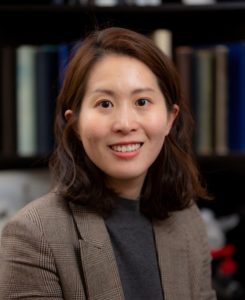 |
Stephanie Kwon is an Assistant Professor in the Chemical and Biological Engineering department at Colorado School of Mines. Her research interest centres on heterogeneous catalysis and sustainability. She brings together cutting-edge research tools, including in-situ spectroscopy, microkinetic modeling, and density functional theory calculations, to understand surface reactions at a molecular-level. In doing so, she aims to tackle our current energy and environmental problems by providing novel catalytic systems with improved energy and atomic efficiency.
Her current research projects include CO2 conversion, low temperature H2O electrolysis for H2 production, biomass conversion (via aldol condensation catalysis), benzene alkylation, and alkene oxidation catalysis. Before joining CSM, she worked as a postdoctoral fellow at the University of California, Berkeley. Find out more about Stephanie’s group on their webpage |
Read Stephanie’s Emerging Investigator article ‘Theoretical assessments of Pd–PdO phase transformation and its impacts on H2O2 synthesis and decomposition pathways‘, DOI: 10.1039/D3CY00404J
1. How do you feel about Catalysis Science & Technology as a place to publish research on this topic?
We truly enjoyed the process. The editors were able to find us reviewers who provided us with useful comments. The turnover was quick and efficient, which we greatly appreciated.
2. What aspect of your work are you most excited about at the moment and what do you find most challenging about your research?
I feel that now is a very interesting time to do research in heterogeneous catalysis. We see lots of changes in the field with new emerging concepts and technologies, including the source of energies that we use to activate bonds in chemical conversions. Sustainability has become one of the major tasks within society, and we are part of those efforts. My research group is excited to contribute to those efforts and make changes in the way we do chemical transformations.
3. Can you share one piece of career-related advice or wisdom with other early career scientists?
I learned that academic careers are much more than research; it is more about teaching, mentoring, and writing. Knowing your own personality and priorities in your life can help you to decide your career paths. That being said, I encourage my students to have broader experiences in teaching, mentoring, writing, and presenting early on in their career. These “soft” skills, often neglected in grad schools, are sometime more important in becoming successful, especially in academia (but probably in other jobs too).










